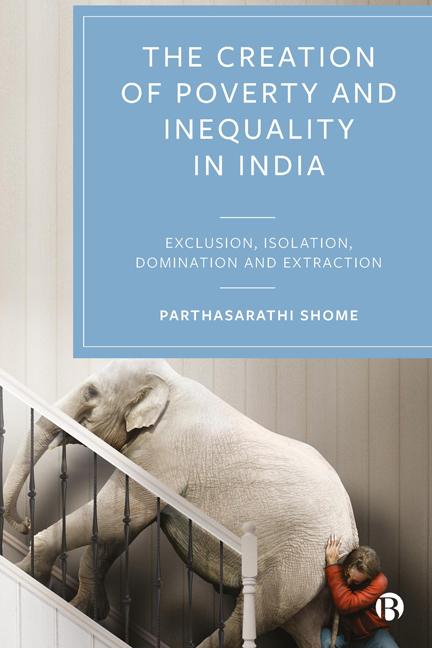Book contents
- Frontmatter
- Dedication
- Contents
- List of Figures and Tables
- Preface
- 1 Introduction
- Part I Macro-Economy and Human Development
- Part II Sources of Inequality and Poverty
- Part III Sectoral Effects
- Part IV Radical Humanism
- Appendix 2.1 Cash Use in India: A Cross-Country Comparison
- Appendix 2.2 Macro-Economic Comparisons: Selected Economies
- Appendix 4.1 Selected Country Tables
- Appendix 5.1 Evidence on Inequality in the US
- Appendix 8.1 Impact of Land Policy
- Appendix 11.1 Impact of Asset Transfer on the Poor
- Index
11 - Blueprint for Addressing Poverty and Inequality
Published online by Cambridge University Press: 18 January 2024
- Frontmatter
- Dedication
- Contents
- List of Figures and Tables
- Preface
- 1 Introduction
- Part I Macro-Economy and Human Development
- Part II Sources of Inequality and Poverty
- Part III Sectoral Effects
- Part IV Radical Humanism
- Appendix 2.1 Cash Use in India: A Cross-Country Comparison
- Appendix 2.2 Macro-Economic Comparisons: Selected Economies
- Appendix 4.1 Selected Country Tables
- Appendix 5.1 Evidence on Inequality in the US
- Appendix 8.1 Impact of Land Policy
- Appendix 11.1 Impact of Asset Transfer on the Poor
- Index
Summary
Always take sides. Neutrality helps the oppressor, never the victim. Silence encourages the tormentor, never the tormented.
Elie WieselIntroduction
The concluding chapter proposes a range of policies based on a spirit of ‘radical humanism’ that could successfully address the challenges of extreme poverty and deepening inequality in India. Why this term is being used may be explained by the radical nature of the proposals while being based on a humanism whose objective is to vanquish poverty and inequality. Earlier chapters had, at various points, explained the need to combine economic, socio-economic and anthropogenic aspects, not shying away from subjectivity to justify a set of arguments and proposals that are found acceptable to traditionalists (Levinas, 2006). The term ‘radical humanism’ was brought up by Amery (2009), in illustrating his experience in a Nazi concentration camp of enduring torture and its supply chain. To quote Gilroy (2019),
In At the Mind's Limits, Amery … interprets his own experience of being tortured and explores it forensically … in grasping the philosophical and political meanings of what he had endured in the concentrationary universe and its supply chains … respond(ing) to those trials by becoming a combative proponent of what he called a ‘radical humanism’ … the outspread wings of ‘the bird of prey’ he called the Gestapo. In those talons, he had acquired a stake in the politics of dignity which could answer the governmental actions that had brought racial hierarchy so disastrously, yet legally, to life … shatter(ing) the flimsy, social conventions of his civilized, inter-cultural childhood, and then hung him from a ceiling hook by his dislocated arms in the dimly lit ‘business room’ of the Breendonk fortress in Belgium: ‘everyone went about his business and theirs was murder’. (p 4)
Amery's recounting of his past is reminiscent of that of the helpless, castaway atishudra, at least metaphorically, both conditions reflecting the accident of birth. Perhaps this imagination is inept reflecting that it is not possible to imagine life experience in either condition unless one has actually lived it. Ironically, technology has contributed useful, eye-opening illustrations of this condition in recent times.
- Type
- Chapter
- Information
- The Creation of Poverty and Inequality in IndiaExclusion, Isolation, Domination and Extraction, pp. 259 - 294Publisher: Bristol University PressPrint publication year: 2023



